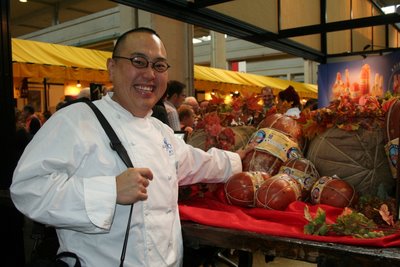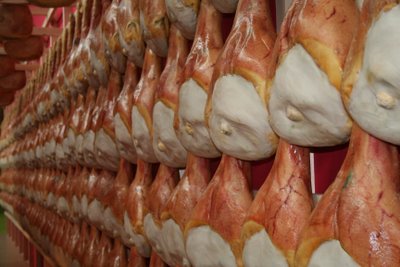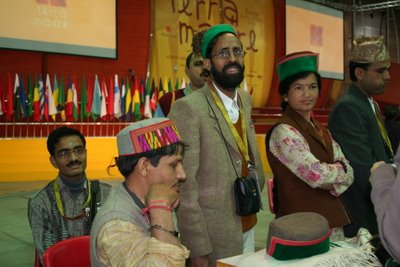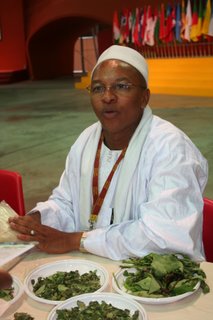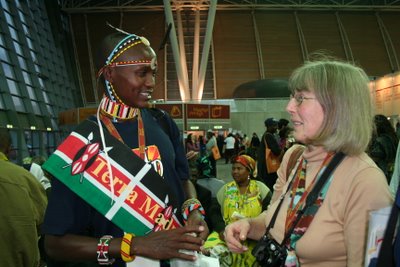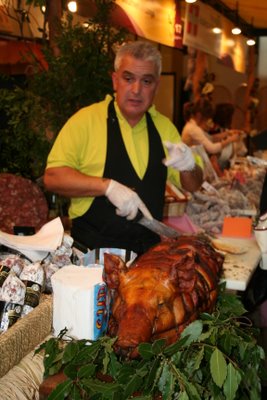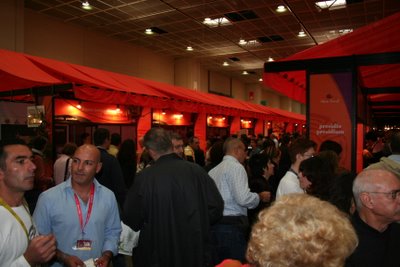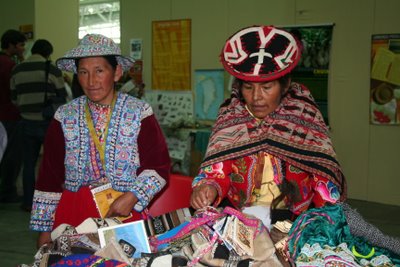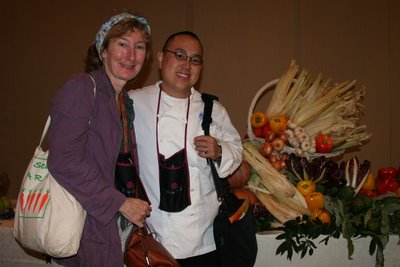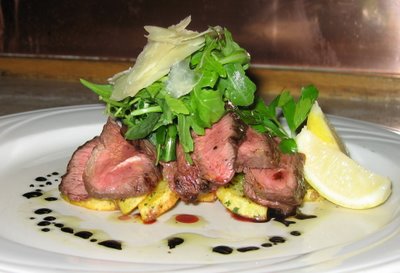In the words of Carlo Petrini, founder of Slow Food
Hearing Carlo Petrini's opening speech was one of the most inspirational moments of the Terra Madre experience so I wanted to share it with you...
Inaugural speech, Terra Madre 2006
Dear Delegates,
Welcome to the second edition of Terra Madre. When I think about how nervous we were in 2004, when we organized the first edition of this extraordinary event, and I see this room today, which is packed after two years of work building a dense network of local communities all over the planet, communities of food producers, farm communities, I think of a metaphor that will do justice to our work here. What did we do in the first edition of Terra Madre? What have we done in these two years? We have prepared the ground; we have spread good fertilizer, we have plowed, we have broken up the soil, and now we are ready to plant our seeds. These are the seeds that will make the network of Terra Madre a tangible and believable thing. And now, all that remains is to ask ourselves, what is the seed?
What is the distinctive sign of this extraordinary session, with citizens, shepherds, nomads and fisherman that have come to Turin from 150 different countries? What is the seed that we have to plant? I’ve given it some thought, and I think that the strong seed of Terra Madre is the practice of the local economy. The local economy that all of us want to bring about in the villages and in the countryside. The local economy that you all know so well is based on three principles: the principle of solidarity, the principle of support, and the principle of subsistence. Solidarity and subsistence are the strength of the local community, and it is in this way that people can produce food. In producing food, people adopt the habits that shorten the distance between the producer and the consumer, to contribute to the wellbeing of the community, to help those who work in the fields to prosper, to give health, to give beauty to their own land. This local economy is in perfect harmony with nature. Look! The communities are primarily a place, a place and a people: the people of a certain place and their local economy are extraordinarily compatible with a philosophy of sustainable development.
On the other hand, you know that the world’s food crises are today a fact of life, visible to everyone. We hear daily about water shortages, excessive use of chemical fertilizers, infertile soils, the loss of biodiversity, global warming and entire ecosystems threatened. People still call it silly, but already the thing is so evident, so strong, that the media can no longer avoid this reality. The communities of people, religious communities, political communities, the most sensible politics, have already made it clear that this food crisis is dramatic! Dramatic. Look! The land is our common home, and our common home must be governed by an honest economy; it must be governed by a natural economy. What governs this earth, on the contrary, with force and often with arrogance, is the iron hand of the market economy; do not confuse, let us not confuse, we must not confuse the market economy with the local economy. The distortions of the same market economy that at the beginning had beneficial effects for communities are evident to everyone today, and the world’s resources are not infinite. And yet you can’t apply a law on the exponential extraction of resources, because the market currently demands hyperproductivity. This generates an unsustainable food situation that is beyond madness. FAO data tells us that we produce food for 12 billion people, when there are only 6.3 billion people living. Meanwhile, 800 million suffer from malnutrition and hunger, 1.7 billion suffer from obesity, and the rate of diabetes is growing exponentially along with cardiovascular diseases caused by malnutrition. It’s madness! It’s madness to continue to ask more from the land. This predation of resources, this logic in which consumption must be fast, is taking us from a point of abundance and waste to a terminal point, it is arriving at its terminal point!
However you all see that this unsustainable economy is becoming clear enough; what is not clear is the degree of our own complicity, our own responsibility as individual consumers in this so-called developed world. To what degree are we in the so-called developed world responsible, complicit, in an unstoppable consumption? It’s because of this that I think it will be difficult for us in the so-called developed world to become the standard-bearers in combating the economy of the market. We are accomplices, we are participants, and you, you citizens living in the so-called underdeveloped world must show us the way, the way of an economy for a relocalization of consumption and relocalization of agricultural production. What’s needed is a return to agricultural production in every single state, and with this, instead of conflict, we must work to build a perspective, a point of view, of true, frank and sincere support at the level of the local economy. The communities present here validate these local economies’ right to exist.
However, you can see that the damage wrought by the many authors of the market economy is not simply the realization of the disaster such as the one being created, not simply that; it is also the ridicule, the sneering, the derision, the declaration that local economies are not scientific. What do you care about these local economies that have no future! That have no perspective! Here there is much work to be done, because this vision is not an archaic one, but it is an extremely modern vision. The dignity of the local economy is the only one that allows for the realization of what is becoming an oxymoron: sustainable development. If we want to bring about sustainable development, we must reinforce the elements of the local economy and be aware that there is so much creativity in the world for making this local economy. You American delegates from green California, you bring about this local farming economy: constructing farmers’ markets that bring together producers and consumers; giving energy back to organic agriculture. You farmers of India bring about an economy that fights the predominance of seeds and reinforces the agricultural economy. Our own Italy, from the moment she chose to support regional production, from the moment she chose to support methodical modes of production that strengthen the fabric of the tourism associated with our beautiful country, she too brings about, consciously or unconsciously, a strong local economy, to such an extent that the market economy now copies the good ideas of typical products and seeks also to take them away. We must have the strength to give this economy back to the citizens, because food must be good, clean and fair.
Good, clean and fair. Good, absolutely good, it is not that we are condemned to eat badly! Even during the historic troubles of this country, many of my gastronome friends speak of the “Italian memory”. The Italian gastronomic memory has a name: hunger. Built into this memory is the wisdom of many women, which brought about, along with a subsistence economy, some masterpieces, very simple, but good. Clean, because one cannot produce nourishment by straining ecosystems, ruining the air, and destroying biodiversity. Fair, because the citizen must be paid; if we want the young people to stay and return to the land here in our countries they must have dignity and fulfillment, and they must be valued. It inconceivable that a civilized nation could enslave the workers of other nations to produce tomatoes. It is inconceivable that a civilized country can encourage organic economies like that of green California at the same time that it reduces many Mexican farmers to slavery.
So good, clean and fair are three adjectives that farmers must offer to the consumers, whom I would like to call co-producers, in an effort to change this system that is turning into a big mistake. This is the meaning of the international network, this is what virtuous globalization means. We are planting the seeds of a virtuous globalization and this virtuous globalization must have the strength to claim the collective rights that make up the economy and that bring about a new frontier of rights. Look at the French Revolution, which strengthened in everyone the knowledge that while we have some individual rights, time and history call us to collective rights. The right to water, the right to clean air, women’s right to remain in the systems of agricultural production, the right to defense of biodiversity, the right to peace, the right to peace. I would like to acknowledge the communities here today that have come from war-torn countries but have nevertheless managed to gather here in Turin. Accompanying them to their villages when they return will be our feeling of gratitude for the work that they do, because for the most part, it is the farmers who pay for these wars.
But the network is brought about also by alliances, and it is for this reason that the 2006 edition of Terra Madre has cooks and university professors present. The cooks because it is they, working culturally and with culture, transform the products of nature. Farmers need cooks, and cooks need good farmers, as well as university professors. It is a marvelous thing that in this public assembly of farmers there are 250 university professors present from all over the world; it’s a marvelous thing because we must safeguard traditional knowledge which, as the great intellectual Claude Levi-Straus has said, has been at risk of disappearing throughout the last 30 years. We must safeguard cultural knowledge, wisdom, the traditions of the rural world, and to do this we must forge an alliance with universities and an alliance with official science. No more misunderstandings between science and traditional knowledge, but more dialogue and collaboration, and you will see that many problems will be resolved, and we will resolve also the problem of genetically modified organisms, if science will speak with the farmers. It is dialogue, dialogue is the perspective we are called to, dialogue with science, with institutions, with politics, and I share the feelings of this entire assembly in expressing gratitude to the president of the Italian republic.
President, President, your presence in this place is a source of pride for us, we are happy to be in a country where the president listens to the voice of the humble, listens to the voice of a suffering world. Mr. President, please allow me to thank your wife, as many of us, many of us know that Mrs. Napolitano has given much of her expertise, her passion and her generosity to defending the cause of the farmers of Campania. Mrs. Clio! We are grateful to you! We are grateful to you! You have welcomed us into your own home! Because the world of farmers speaks a different language in every part of the world, and the world of farmers is grateful to you as someone who has spent time, with passion and generosity, defending just causes. In conclusion, dear delegates, I want to bear witness to the all the affection of this generous region of Piedmont, of this beautiful city of Turin, this affection that has offset the fatigue of the long journeys of these days, journeys undertaken by people who have left their armaments behind in the faraway lands of Mongolia or Nordic lands, by those who have moored their fishing boats on the great Lake Victoria, or on the coast of Alaska or on the Amazon River, by those who have descended from the mountains of the Andes or of Tibet, by those who have left the fields of rice in India or Madagascar.
Thank you! Thank you for the gift of your presence. If the earth is our mother, brotherhood will govern these days of work. There are no differences of race, of idiom, of culture, of creed, of religion. We know that the brotherhood is stronger. Allow me to pay tribute to you, delegates from all over the world, by paraphrasing a great Piedmontese poet: “If the world resists, the world must do it by means of people like you. People who accept the new civilization, but only up to a certain point. People who do not believe that advancement necessitates all of the past, people who do not see unhealthy contradictions between modern and old customs, people who hold in their hands the future of the earth.”Have a nice Terra Madre, everyone.
Chef Tory with Carlo Petrini before the dinner of 1,000 chefs.


